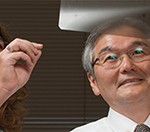At its national meeting on November 19, 2010, the Arthritis Foundation (AF) honored two rheumatology professionals who have made significant contributions to improving the lives of patients with rheumatic disease.
Physician-scientist Wayne M. Yokoyama, MD, was awarded the AF’s 2010 Howley Prize. Dr. Yokoyama is the Sam J. and Audrey Loew Levin Chair for Research in Arthritis at Washington University School of Medicine in St. Louis, Mo. The Howley Prize recognizes researchers whose work in the previous five years represents a significant advancement in the understanding, treatment, or prevention of arthritis.
Rheumatologist James Louie, MD, professor emeritus of medicine and rheumatology at David Geffen School of Medicine at the University of California-Los Angeles, was honored with the Charles B. Harding Award for Distinguished Service, the foundation’s highest national volunteer award. The Harding Award recognizes a volunteer who has provided leadership and direction to the AF, given their time and talent generously to help others, and challenged other foundation volunteers to be their best.
Open to Discovery

Dr. Yokoyama was recognized for his important discoveries on the role of natural killer (NK) cells, an interesting immune cell population that has cytotoxic activity and may play a key role in regulating the immune response as well as tumor cell killing. Specifically, Dr. Yokoyama’s research identified the Ly49A receptor, which is responsible for inhibiting NK cells, components of the immune system. The 1992 discovery, the first identification of an NK cell receptor, ultimately helped reveal how NK cells defend the body against viruses and kill certain types of tumors.
Prior to Dr. Yokoyama’s findings, scientists believed NK cells were insignificant to immunity because, unlike T and B cells, they didn’t appear to discriminate between particular pathogens or tumors.
In 2005 Dr. Yokoyama made further progress in understanding how NK cells function and what processes influence their potency. He found that NK cells work efficiently throughout life only if they are “licensed.” During licensing, Ly49A or another NK cell inhibitory receptor must bind to certain molecules in order to allow the cell to change and function properly.
His work has led to a host of other NK cell observations. Dr. Yokoyama says researchers in other labs are providing convincing evidence that NK cells may be involved in autoimmune conditions such as juvenile rheumatoid arthritis.
“I was of, course, delighted to be selected by the Arthritis Foundation’s review panel,” says Dr. Yokoyama. “It’s ironic. We didn’t set off specifically to do arthritis research.”
